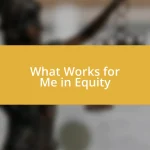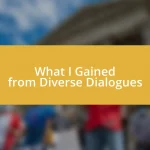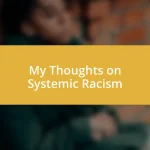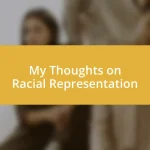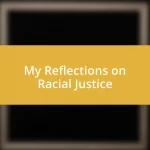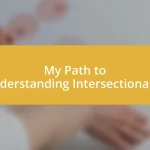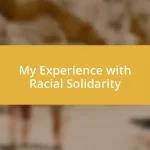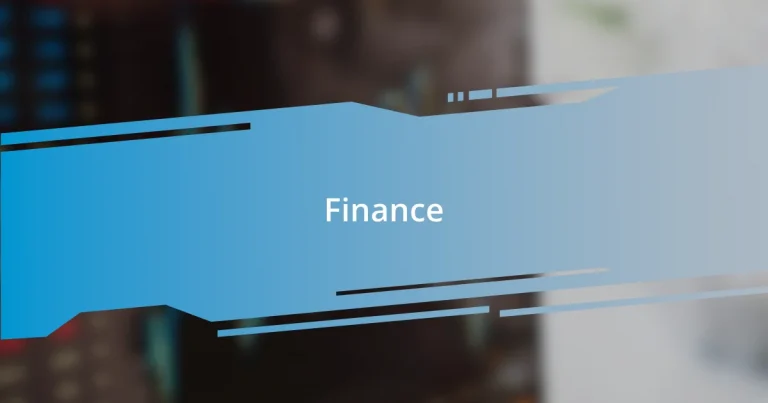Key takeaways:
- Understanding societal perceptions requires navigating stigma and recognizing how cultural, media, and personal experiences shape views on mental health and other issues.
- Acknowledging diverse experiences fosters empathy and can bridge gaps in understanding, emphasizing the need for open conversations about privilege and systemic inequalities.
- Promoting community support systems and open dialogue is essential for resilience, encouraging connection, and empowering marginalized voices to inspire change and greater understanding.
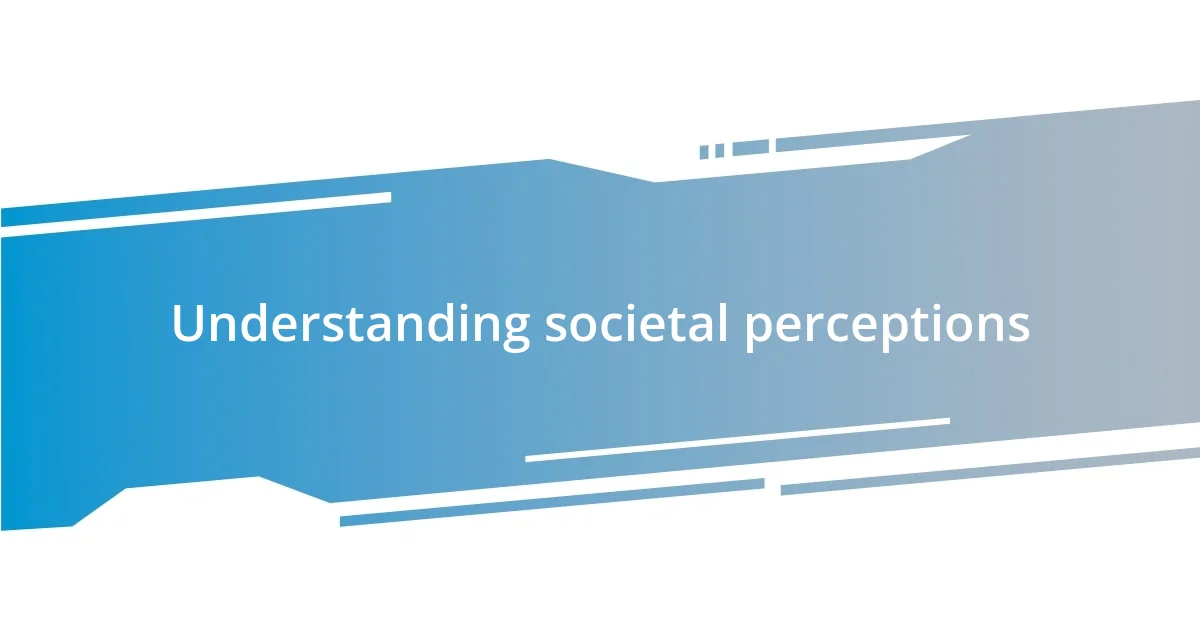
Understanding societal perceptions
Understanding societal perceptions can be a tricky landscape to navigate. I remember a time when I openly expressed my views on mental health. The backlash was swift, revealing just how deeply ingrained the stigma is. Have you ever found yourself hesitating to voice your thoughts for fear of judgment? It’s a common struggle many face when challenging societal norms.
As I delve into conversations about societal perceptions, I often find that they are shaped by a variety of factors, including culture, media, and personal experiences. For instance, after attending a workshop on body positivity, I realized how often we internalize harsh standards set by society. Why do we allow these external narratives to dictate our self-worth? This internal conflict is something that so many of us experience but seldom discuss.
What strikes me most is how perceptions can shift dramatically through a single conversation or encounter. I recall meeting someone whose background was drastically different from mine, and it opened my eyes to a whole new set of beliefs and experiences. This makes me wonder—how much do we truly understand about the lives of others, especially those with differing viewpoints? It’s a reminder that each perspective is a thread in the larger tapestry of society, deserving of consideration and empathy.
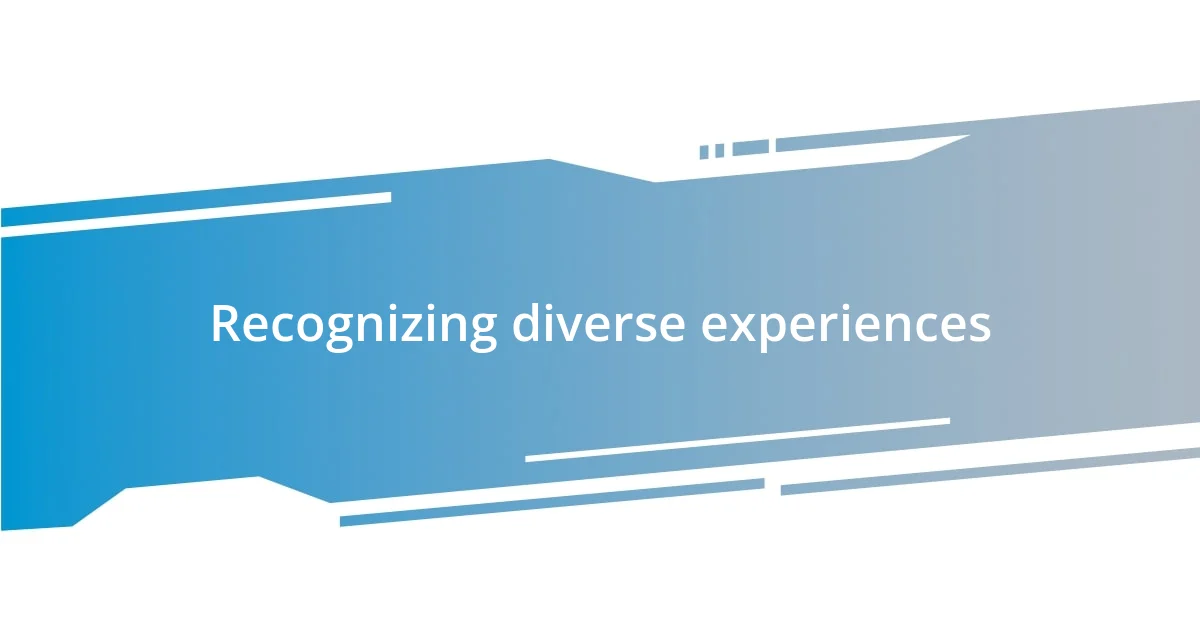
Recognizing diverse experiences
Recognizing the diversity of experiences around us is vital for fostering empathy and understanding. I remember a friend sharing her experience growing up in a community where education for girls was undervalued. Hearing her story made me reflect on the privileges I often take for granted. Have you ever considered how varied life journeys shape our perspectives? I think we all have stories that could illuminate different facets of our existence.
It’s interesting how our backgrounds can influence our reactions and opinions. I once participated in a discussion group where participants shared their unique experiences with discrimination. Listening to their accounts made me realize the layers of struggle many face daily, something I had never encountered personally. This realization hit me hard—why don’t we talk more about these diverse narratives? They could serve as a bridge to greater understanding among us all.
In my view, acknowledging diverse experiences not only enhances our understanding but also enriches our interactions. I recall attending a cultural event where different traditions were showcased. It was eye-opening to see how various cultures approach similar life challenges. Have you ever felt a deep connection to someone simply through shared experiences, even if their life story was vastly different? Moments like these remind me that we are more alike than we tend to believe, teaching us that every story is essential in crafting a collective narrative.
| Experience | Impact |
|---|---|
| Education challenges for girls | Highlighting privilege and gender inequality |
| Discrimination accounts | Revealing layers of struggle and empathy |
| Cultural events | Fostering understanding through shared experiences |
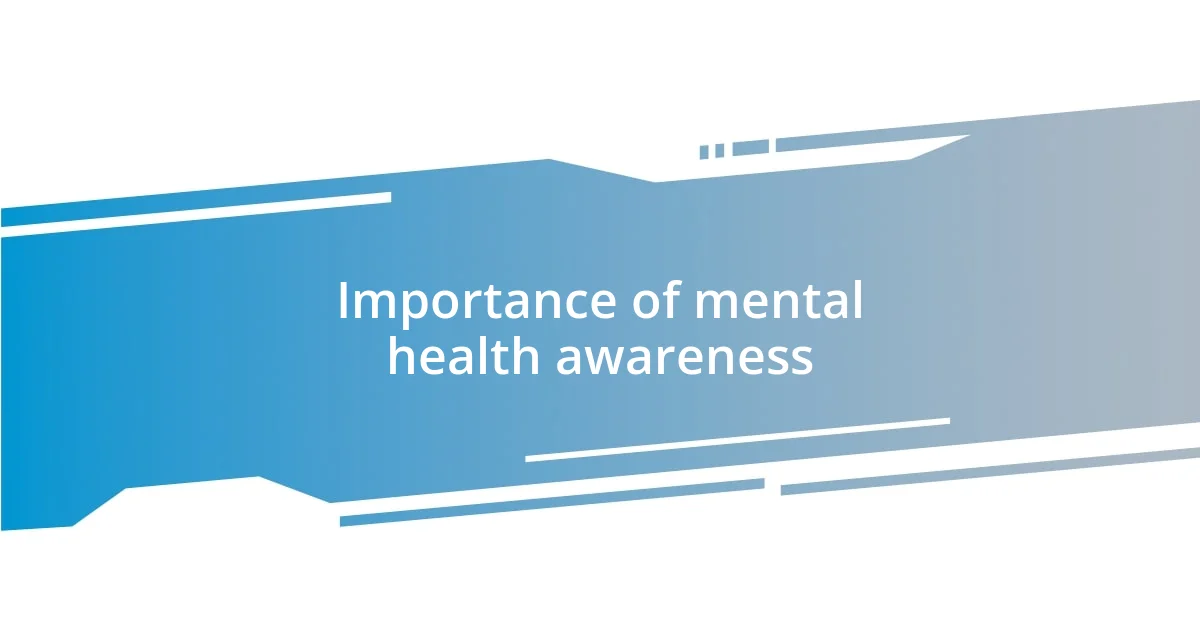
Importance of mental health awareness

Importance of mental health awareness
Mental health awareness is crucial for creating a more understanding and supportive society. I remember a time when a colleague of mine silently struggled with anxiety during a big project. It wasn’t until we had a team-building exercise that he opened up about his experiences. This moment underscored for me just how vital it is to foster an environment where individuals feel safe discussing their mental health.
The benefits of spreading mental health awareness are profound. Here are a few key insights I think could reshape perceptions:
– Reducing stigma: Open conversations about mental health can dismantle harmful stereotypes.
– Encouraging support: With awareness, those who may be struggling feel less isolated and more inclined to seek help.
– Improving overall well-being: A society that understands mental health can cultivate safer spaces, ultimately benefiting everyone’s emotional health.
– Promoting education: Awareness campaigns can equip individuals with the knowledge they need to support themselves and others effectively.
– Fostering inclusion: Recognizing mental health issues leads to better accommodations in workplaces and schools, creating more inclusive spaces.
Understanding mental health is not just an academic pursuit; it’s a personal journey for many. I recall attending a mental health panel where experts shared their stories, emphasizing that mental health issues do not discriminate. This realization made me reflect on my own experiences, turning what often feels like a taboo subject into a collective conversation that we should all engage in. It’s this level of understanding that can truly change lives.
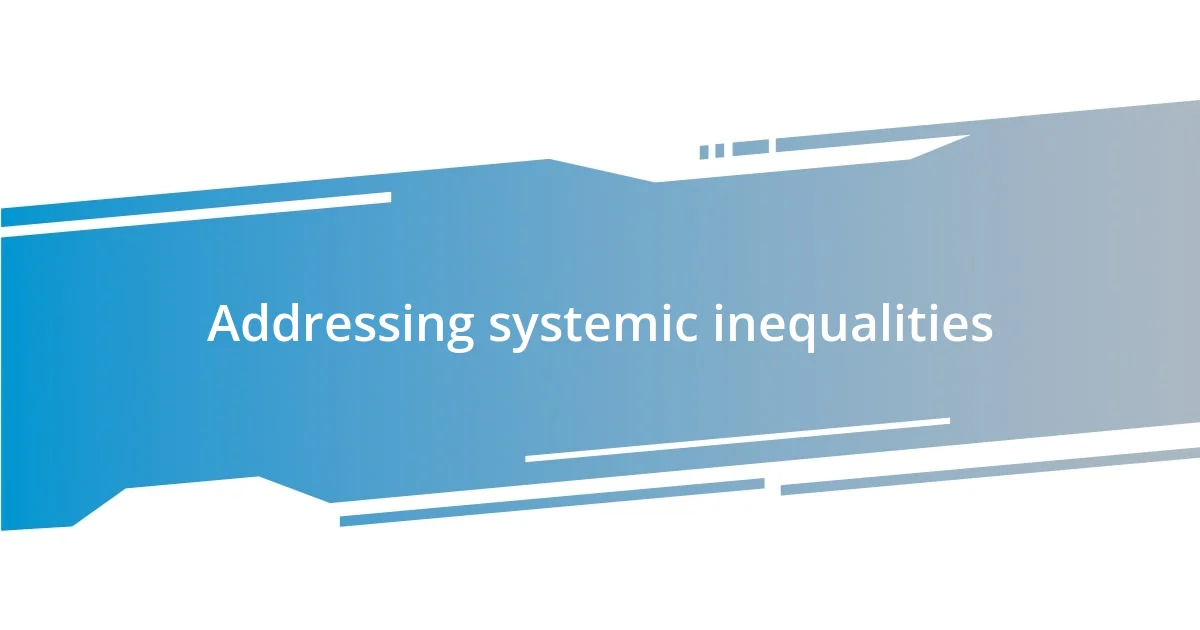
Addressing systemic inequalities
Addressing systemic inequalities requires us to confront uncomfortable truths about privilege and access. I recall a moment during a community meeting where a speaker highlighted the stark disparities in healthcare access across neighborhoods. It struck me how easily we can overlook these differences if we aren’t actively listening and engaging with communities affected. Have you ever thought about how someone’s zip code can determine the quality of their healthcare? It’s eye-opening and heartbreaking.
In my experience, acknowledging systemic inequalities goes beyond mere awareness—it compels action. I once volunteered at a local food bank, and the stories I heard from families struggling to make ends meet were profound. They challenged my preconceptions about poverty, revealing not just individual hardships but a larger system that often fails to support its most vulnerable members. This is why I believe that addressing systemic inequalities must involve amplifying these voices. How can we truly understand the issues without first hearing from those directly affected?
Every time I reflect on the systemic barriers many face, I feel a mix of frustration and motivation. For instance, during conversations about education, I often see the discussion overshadowed by anecdotes of personal success. While those stories are valuable, they can unintentionally mask the systemic factors that inhibit countless potential students from reaching their goals. Recognizing these barriers makes me question what steps we can collectively take to ensure that every student has an equal chance at success. What changes can we advocate for to dismantle these systems of inequality? It’s a challenge that calls for both empathy and urgency.
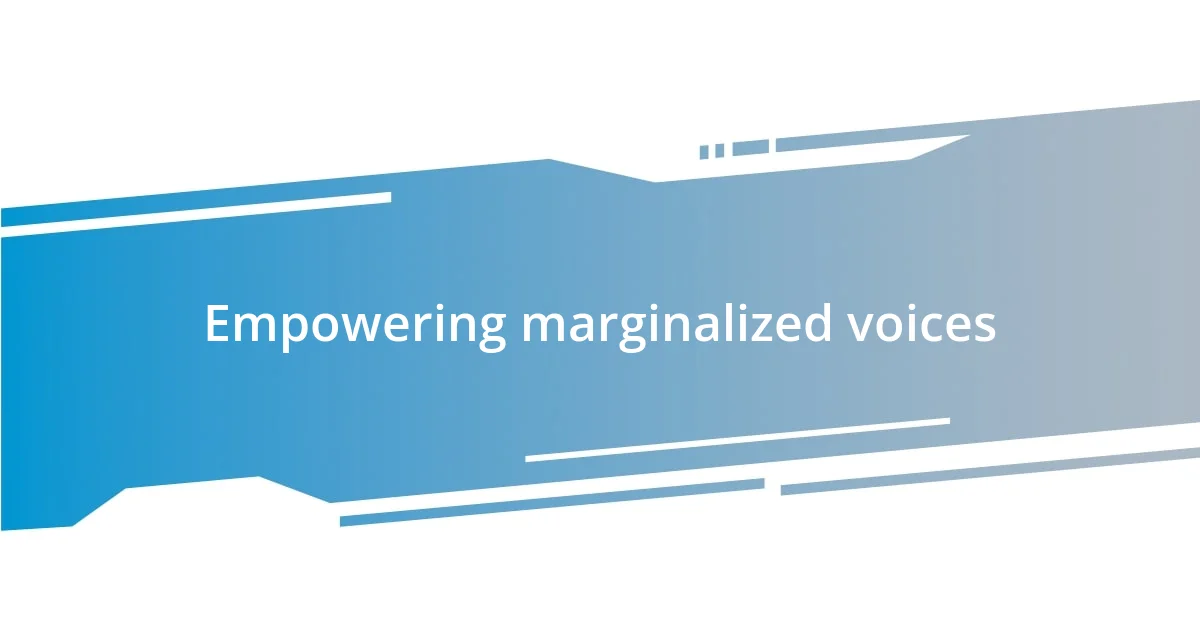
Empowering marginalized voices
Empowering marginalized voices is essential for building a more inclusive society. I once attended a local forum where individuals from various backgrounds shared their stories about feeling voiceless. It was a powerful reminder of how often we overlook their experiences, and it got me thinking—what if we made a concerted effort to amplify their narratives? By actively listening and creating platforms for these voices, we can cultivate understanding and compassion that prompts real change.
Reflecting on my own experiences, I’ve witnessed firsthand the transformative power of storytelling. At a community event, a young woman spoke about her struggles as a single mother navigating systemic barriers. Her vulnerability resonated with many in the audience, prompting a dialogue that sparked ideas for collaborative solutions. This moment reinforced my belief that when marginalized voices are uplifted, they not only inspire others but also catalyze actions that can address long-standing issues. Have you ever experienced the subtle shift in perspective after hearing someone’s lived reality?
Empowerment often begins with visibility. I remember volunteering for a nonprofit focused on art for social change. One day, we hosted a workshop where participants expressed their stories through various artistic mediums. The results were stunning; it felt like we were peeling back layers of silence to reveal powerful truths. It made me realize that self-expression can be a form of empowerment. What if everyone had access to such creative outlets? The ripple effect could be vast, nurturing a culture that values all voices, especially those often silenced.
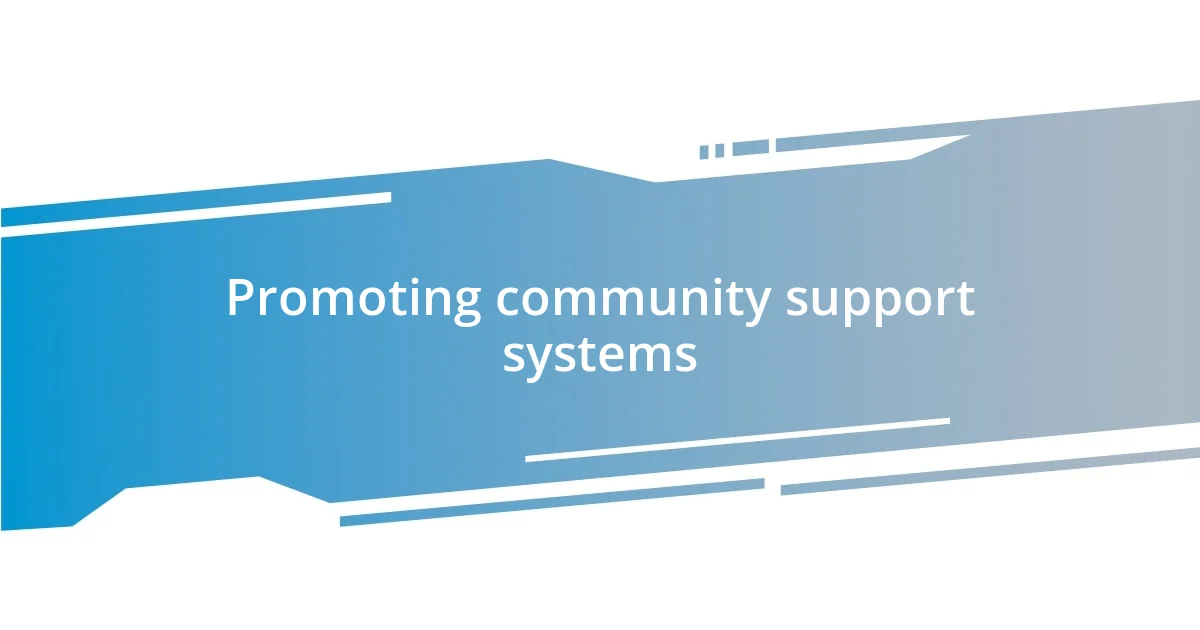
Promoting community support systems
Promoting community support systems is crucial for fostering resilience and interconnectedness among individuals. I recall a neighborhood initiative I participated in, where we set up a buddy system for new immigrants. The profound connections formed during those coffee meet-ups were heartwarming; they turned strangers into friends and created a safety net for those navigating new environments. Have you ever thought about the power of simply being there for someone who feels lost?
In my experience, support systems thrive on shared resources and mutual aid. I once helped organize a clothing drive, and the eagerness of community members to donate what they could was remarkable. Each contribution not only provided warmth to those in need but built a sense of belonging within our neighborhood. It made me reflect—imagine the impact if everyone made a small effort to contribute to their local community. What could we achieve together?
Listening actively is another cornerstone of effective community support systems. I remember sitting in on a discussion group where residents shared their struggles with mental health. Just the act of giving space for those conversations was transformative; people felt seen and validated. It struck me how often we overlook the simple act of listening. What if we all took a moment to check in with our neighbors or friends? I believe these small efforts can create a ripple effect of compassion that strengthens our communities.
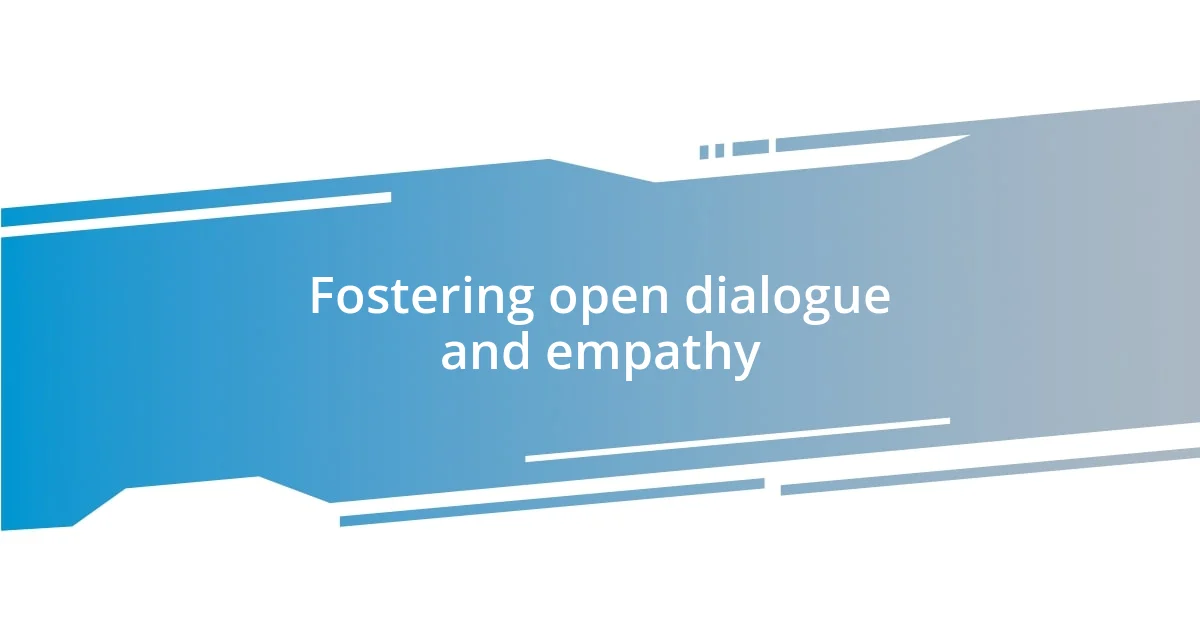
Fostering open dialogue and empathy
Fostering open dialogue and empathy ultimately begins with a willingness to have difficult conversations. I remember a discussion I had with a colleague about social justice. It felt uncomfortable at first, but as we peeled back layers of our beliefs and experiences, a deeper understanding emerged. Have you ever noticed how vulnerability can pave the way for empathy? It was in that moment that I realized honest dialogue can bridge gaps that we often think are insurmountable.
One time, during a community gathering, our group engaged in an exercise where we paired off to discuss our perspectives on mental health. As I listened to my partner’s struggles, I felt an overwhelming sense of connection. It struck me how sharing our experiences allows us to recognize our shared humanity. What if everyone had the opportunity to openly share their stories without fear of judgment? I truly believe that these exchanges can create an environment where empathy flourishes and compassion becomes a shared value.
I’ve found that creating safe spaces for dialogue can significantly enhance our ability to understand one another. For instance, I once participated in a workshop designed to teach active listening skills, and the impact was profound. The moment I learned to listen without formulating a response in my mind, I could truly hear what others were saying. Can you imagine how different our conversations might be if we approached them with genuine curiosity? It’s this kind of openness that fosters real connections and nurtures a culture of empathy, allowing us to embrace our differences rather than shy away from them.

